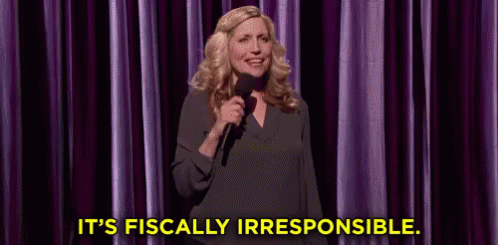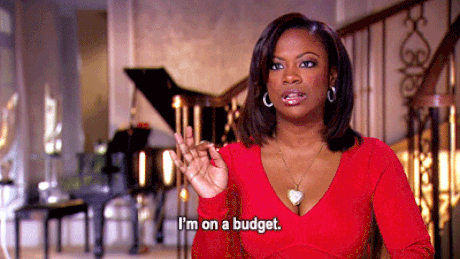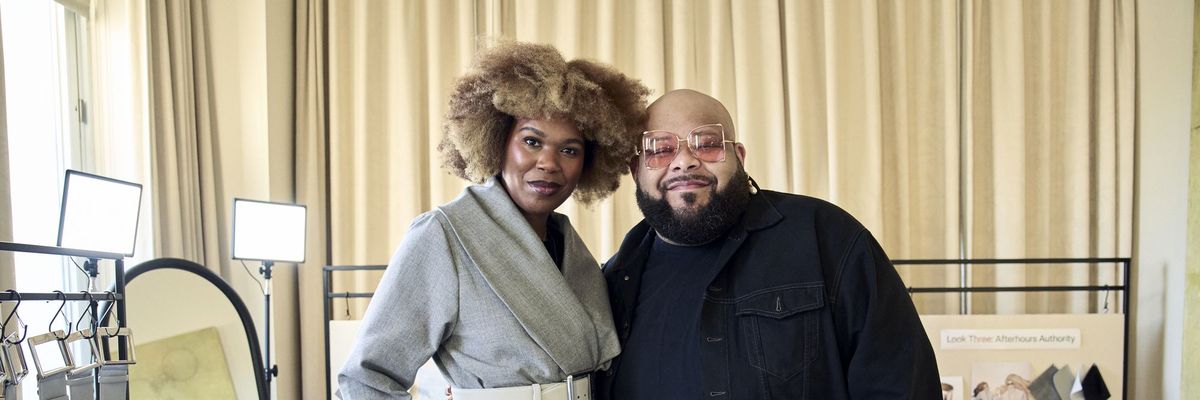
When you hear the word "minimalism", your mind probably formed an image of some privileged man with a dingy backpack wearing wrinkled khakis and flimsy flip flops. And if he has a place to live, you may imagine one plaid chair, one chipped plate, and one fork. We can even hear his voice tell those of us who value money, things, and experiences that we're too superficial. I'm also willing to bet that we're not about that lifestyle.
But what if I told you that minimalism isn't all tiny homes or hand-me-downs? What if I said we can still have nice things? Or that minimalism is just living in a way that gets rid of the meaningless stuff and curates a lifestyle filled with peace, purpose, and freedom? And let me not forget the best part of it all: You can ultimately build your bank account, too.
Christine Pratt understands the accumulation of things and the impact it has on our well-being as well as our coins. This Afrominimalist — as she's known on the 'gram — once had a closet full of accessories, shoes, and handbags within handbags within handbags as well as shelves full of knick-knacks. Yet, she reached a point where her life felt messy and oftentimes overwhelming. It wasn't until she cleared her apartment of anything that didn't serve a specific purpose that she was able to breathe. Christine makes a deeper connection between material, mindset and money in her first TED Talk titled "You Can Be a Minimalist, Yes You!" that she delivered this past November.
Fellow minimalists Roshanda Cummings (Roe) and Erin Johnson (E) are the individuals behind the Instagram community Brown Kids. Just a few years ago, an overworked Roe was ready to quit her underpaid job but worried about the rack of credit card debt that she created for her racks of clothing. But by adopting a minimalist lifestyle, she managed to pay off $11K in 11 months on a $19K annual salary.
11 whole thousand.
In less than a year.
On less than $20K per year.
How'd they do that?
"You have money," Roe says, "It's just in your stuff."
What kind of stuff, you ask? It's all those jeans we packed away in a tote because we're going to pull them back out when we lose those last 10 pounds. It's also the three types of edge control that we tucked way under the bathroom sink because they don't lay our baby hairs at all but we're keeping them, dammit, because we spent a lot of money on these jars! And some may say it's all the books I had neatly stacked and shelved but to that I'd reply, Mind yo' business. I'm reading all of them!
I suppose I can agree that it's all clutter and there are numerous studies linking physical clutter to internal clutter, but that's a whole other article. And the stuff that's out in the open for all to see? At some point we need to clean it, move it elsewhere, or dust it. Or even worse? Pack it up should we ever move! Embracing minimalism means that we either trash it, get paid for it, or pay it forward if we're not using it or getting some joy out of it. Minimalism also promises that we'll feel good for doing it.
Intrigued? Or still unsure? Read on for 4 points we can glean from Roe and Christine when it comes to adopting a minimalist lifestyle, especially when it comes to our bucks:
It empowers you to find “hidden” money.

E and Roe helped their Brown Kids community find $120K in forgotten money during a weeklong Instagram challenge. Roe stresses that regardless of our salaries, we always have extra money somewhere. She cashed in a stagnant 401(k) worth $4K from an old job but she also found $7K in unwanted stuff that she could sell and applied all of the proceeds directly to her credit card balance. And while we are aware of those sites where we can sell our infrequently or unworn clothing and shoes like Poshmark and Mercari, do we know about unexpected or forgotten refunds and utility deposits that we are due but we somehow overlooked? Did you know you can check with your state's unclaimed property department to see if any of those types of funds are waiting for you? Claim your coins, sis!
It encourages you to look at your finances differently.

Something about a strict budget is a turnoff. It seems to put an emphasis on the things we can't have because they were considered too minor to include in our monthly spending, like a caramel frappuccino. Although minimalism forces us to distinguish between wants and needs, it isn't designed to be as limiting as a traditional budget. Instead it makes us look inward to decide what's important to us and why.
Christine explains that our current spending habits are a reflection of how we were raised. As an attorney and author, she became the first person in her family to be able to acquire any and everything, which led to her overconsumption of purses and heels. Once we get to the root of our destructive spending habits, we'll automatically make different financial choices going forward, which means we'll think twice before making a frivolous purchase.
It helps to decrease unnecessary food waste.

Shutterstock
In 2010, food waste was estimated to be about a third of the food supply, or a whopping $162B! We contribute to this figure when we buy and cook more than we can eat and then it spoils, causing us to throw it all out. But that doesn't mean we need to resort to canned or dried foods!
E and Roe are the brainchildren behind the Jar Method, which is their way of storing and extending the life of produce from three days up to three whole weeks. E and Roe saved $500 the very first month they kept their veggies in glass jars instead of in plastic bags and containers. And not only did they lower their monthly grocery bill, but they also made their refrigerator shelves look pretty, too.
It shows us that sales don’t automatically add up to savings.

One of the biggest myths about minimalism is that you can't shop, especially for items at full price. Lies. E and Roe snatched up a pristine secondhand outdoor furniture set a few months ago but they also looked to decorate their interior with West Elm or CB2.
"A minimal mind is not about cheapness or class," says Roe during an earlier interview with Impossible Podcast. She explains that it's about clarity. Will this item reflect you or the person you want to be? Will this item bring you joy?
Roe isn't against splurging on an item of clothing, either, but if it's expensive, she's mindful of its quality, sustainability, and usability. What is it made of? Will it last? How was it sourced? Will she wear it more than once?
"Sometimes you'll spend a lot and sometimes you spend less and sometimes you won't spend at all," Roe adds.
Christine often refers to Project 333, a challenge where you mix and match 33 favorite pieces (including accessories and shoes) to create new outfits for 3 months. This way, you essentially end up with a complete seasonal wardrobe that takes up less closet space.
Buying new quality pieces to fulfill the 33-item capsule wardrobe isn't forbidden and buying as much as you can for as little as possible isn't a requirement or even a recommendation. In fact, snatching up everything you see on clearance is frowned upon and defeats the purpose of minimalism.
Bargain-shopping for Christine was once an escape until it wasn't. She was stunned by all of her purchases with price tags still hanging on them. Sure, she walked out of the store with shopping bags full of merchandise at a deep discount but she didn't exactly gain anything when she wasn't even wearing, using, or really liking anything she bought. "Remember, it's not a deal if you don't need it," Christine says.
Minimalism isn't as extreme as we may think. The sole intent shouldn't be to make unreasonable or unrealistic sacrifices or forego everything of luxury or leisure to stretch our hard-earned dollars. It's not even about junking our most sentimental treasures, either.
Instead, minimalism is about sparking more joy with less stuff and living much better in the process. Sure, it may still be hard to give up some things because, let's face it, who's really a pro at purging their own belongings? But imagine that bit of excitement we'll get when we move those dollars from credit card balances to savings account balances with items we don't use, don't care about, and won't miss.
Want more stories like this? Sign up for our newsletter here and check out the related reads below:
6 Ways You Can Start Stacking Your Savings
The Minimalist Guide To Fall Style
10 Budgeting Apps That Will Get Your Coins All Together
Featured image by Shutterstock
Did you know that xoNecole has a podcast? Subscribe on Apple Podcasts or Spotify to join us for weekly convos over cocktails (without the early morning hangover.)
- 4 Ways I’ll Continue To Save Money Post-Quarantine - xoNecole: Women's Interest, Love, Wellness, Beauty ›
- Starting A Minimalist Lifestyle, Advice - xoNecole: Women's Interest, Love, Wellness, Beauty ›
- How to Save Money Like a Minimalist | Minimalist Money Saving Tips ›
- 7 Minimalist Lifestyle Tips That Save Time and Money - The Portable ... ›
- Save Money with Minimalism - YouTube ›
- 3 Super Simple Ways that Minimalism Saves You Money ›
- 5 Minimalist Secrets to Saving Money | Simplicity Relished ›
- 7 ways minimalist living can help you save money ›
- How minimalist millennials are going to extremes to save money ›
- How Minimalism Saves Money and Improved My Financial Life ›
- 5 Practical Ways Minimalism Saves Money ›
- 8 Ways a Minimal Lifestyle Can Help Your Finances ›
This Is How To Keep 'Holiday Season Stress' From Infecting Your Relationship
Hmph. Maybe it’s just me, but it seems like there is something really weird happening in the fall season air (because winter doesn’t officially begin until December 21) that cuddle season is in full swing while break-up season is as well. In fact, did you know that break-ups are so popular during the holiday season that December 11 is deemed Break-Up Day?
The reasons why relationships shift around this time vary; however, I did both roll my eyes and chuckle when I read that a very popular one is because it’s an easy way to get out of getting one’s significant other a Christmas present. SMDH.
Anyway, I personally think that the less shallow folks out here may contemplate calling things “quits” or they at least distance themselves a bit from their partner (and what I’m referring to is serious relationships) due to all of the stress and strain that oftentimes comes with the holidays whether it be financial, familial, due to their tight schedules or something else.
Listen, I would hate for you and your man to miss the fun and happiness of experiencing this time of year, all because you are so overwhelmed or irritated that you can’t really enjoy it. That’s why I have a few practical tips for how to avoid allowing the typical holiday season stress from INFECTING your relationship.
Manage Your Expectations
 Giphy
GiphyUnmanaged expectations. If there is a main reason why the holiday season tends to be so stress-filled for so many people, I’d bet good money that this is the cause. And when you’re in a long-term relationship, expectations can manifest themselves in all sorts of cryptic and/or unexpected ways. You might have relatives who assume that you are going to be with them for Thanksgiving or Christmas when you have other plans in mind. You might be thinking that you are going to spend one amount for presents while your man is thinking something totally different. When it comes to scheduling, your signals may be crossed.
And you know what? To all of these scenarios, this is where clear and consistent communication come in. Don’t assume anything. Don’t dictate anything either. From now until New Year’s, mutually decide to check in once a week, just to make sure that you are both on the same page as it relates to the holidays and what you both are thinking will come along with it. The less blindsided you both feel, the less stressed out you will be. Trust me on this.
Set (and Keep) a Budget
 Giphy
GiphyOkay, so I read that last year, 36 percent of Americans incurred some type of holiday-related debt. Hmph. Last year, there was still some sense of normalcy in this country, chile, so I can only imagine what finances are gonna look like over the next several weeks. That said, since I don’t know a lot of people who don’t find being broke stressful, make sure that you and your bae set a budget and then stick to it this year — no ifs, ands or buts.
Because really, y’all — it doesn’t make sense to deplete savings and/or max out credit cards for a few days of giggles only to be damn near losing your mind because you don’t know how to make ends meet come Dr. Martin Luther King, Jr. Day.
And by the way, this tip doesn’t just speak to things like food and gifts; I also mean travel. If it doesn’t make a ton of sense (or cents) to be all over the place this year — DON’T BE.
Keep Matthew 5:37 at the Forefront
 Giphy
GiphyIf off the top of your head, you don’t know what Matthew 5:37 says, no worries, here ya go: “But let your ‘Yes’ be ‘Yes,’ and your ‘No,’ ‘No.’ For whatever is more than these is from the evil one.” That verse right there? Oh, it’s a boundaries lifesaver! I say that because do you see “maybe” or “I’ll think about it” in there? Nope. LOL. It says that you should tell people “yes” or “no” and leave it at that — and that complements Anne Lamott’s quote, “’No’ is a complete sentence” impeccably well. Yeah, you’ve got to remember that anything beyond a yes or no to a request is privileged information; you don’t owe anyone details or an explanation.
Besides, if you are really honest with yourself, when someone asks you something and you give a “Umm, let me think about it” kind of reply, more times than not, you already know what your answer is going to be — so why not let you both off of the hook? Give your response. Commit to that. And let everyone (including yourself) get on with their lives and schedules.
I promise you that when it comes to those holiday parties, you are pissing more folks off by not RSVP’ing or doing so and not showing up than just saying, “Thank you but not this year” off the rip.
Remember That Your Personal Space Is Privilege Not a Right
 Giphy
GiphyA friend of mine recently bought a new house and invited me over to come see it. He’s a single man with no children, so as I was taking in all of the space that he had, especially as I walked through his finished basement, I joked about relatives coming to live with him. “Hell no” and “absolutely not” were pretty much his immediate responses as he went on to say that some folks even had the nerve to be offended when he told them that he had no intentions on taking DNA in.
Ain’t it wild how people think that your stuff is their right? And yes, that brings me to my next point. Your home is your sanctuary space. If you want to host folks this year — cool. If not, ALSO COOL. Please don’t let folks (family included) guilt you into how they want you to act or even into what they would do if the shoe was on the other foot. You are not them — and as one of my favorite quotes states, “If two people were exactly alike, one of them would be unnecessary.” (A man by the name Larry Dixon said that.)
Hell, my friends? They know that I am good for sending them random things that they need or even want all throughout the year. Coming over to hang out at my pace, though. Uh-uh. Chalk it up to being a card-carrying member of the ambivert club yet I like keeping my living space personal — and I sleep like a baby, each and every night, for feeling that way.
Always remember that your space, your time, your resources, your energy and shoot, yourself period (including your relationship), are all things that are your own. You get to choose how, when and why you want to share them. The holiday season is certainly no exception.
Cultivate Some “You Two Only” Traditions
 Giphy
GiphyIt’s not uncommon for some couples to hit me up after the holiday season to “detox.” Sometimes it’s due to the financial drama (and sometimes trauma) that they experienced. Sometimes it’s because they allowed their relatives (especially in-laws) to get more into their personal business than they should’ve. More than anything, though, it tends to be because they didn’t get enough quality time together and so ended up feeling “disconnected.”
Please don’t let that happen. Listen, I’m not even a holidays kind of woman and yet, I will absolutely sit myself down with some hot chocolate and chocolate chip cookies to enjoy a Hallmark holiday film or two. Aside from the fact that most of them are lighthearted and sweet, I also like that they usually focus on couples loving on each other amidst all of the holiday beauty and ambiance — which is something that all couples should set aside some time to do.
Maybe it’s a vacation. Maybe it’s a staycation. Or maybe it’s my personal favorite, A SEXCATION. Whether it’s for a few days, the weekend or even overnight — don’t you let the holidays go by without setting aside time for you and your man to celebrate one another. Don’t you dare (check out “Are You Ready To Have Some Very Merry 'Christmas Sex'?”).
GET. SOME. REST.
 Giphy
GiphyI once read that 8 out of 10 people get stressed out over the holidays and 3 out of 10 lose sleep during to it — and when you’re stress-filled and sleep-deprived, that can absolutely lead to hypersensitivity, making mountains out of molehills and even not being in the mood for sex.
Your relationship can’t afford to go through any of this, so definitely make sure to prioritize rest. I don’t care how unrealistic it might seem during this time, sleep should never be seen as a luxury; it will always and forever be a great necessity.
That said, try to get no less than six hours of shut-eye in (check out “6 Fascinating Ways Sex And Sleep Definitely Go Hand In Hand”) and even ask your bae to take a nap with you sometimes (check out “Wanna Have Some Next-Level Sex? Take A Nap, Sis.”). Not only will sleep help to restore your mind, body and spirit but, when it’s with your partner, it’s an act of intimacy that can make you both feel super connected, even in the midst of what might feel like chaos.
___
Holiday season stress is real. Still, never give it the permission or power to throw your relationship off. Put you and your man first and let the holidays be what they are gonna be, chile.
Let’s make things inbox official! Sign up for the xoNecole newsletter for love, wellness, career, and exclusive content delivered straight to your inbox.
Featured image by Shutterstock
Sergio Hudson On Designing With Intention And Who Gets Left Out Of The Industry
Sergio Hudson dreamt big as a young South Carolina boy staring out of the window of his mom’s Volvo driving down the Ridgeway, South Carolina streets. Those dreams led him to design opulent tailoring that’s been worn by Beyoncé, Queen Latifah, former Vice President Kamala Harris and Forever First Lady Michelle Obama, just to name a few.
Those dreams have come full circle in a new way as he recently collaborated with Volvo for a mini capsule collection suitable for chic and stylish moments this fall. The 40-year-old designer follows a long legacy of fashion aficionados who’ve used their innovation to push the automotive industry forward, including Virgil Abloh, Eddie Bauer, Paul Smith and Jeremy Scott.
Using the same material from the interior of the Volvo EX90, Hudson crafted a wool-blend car coat and waistbelt that combine the vehicle’s Scandinavian design with his signature tailoring and intention. The exclusive collection launched on October 20, and each piece is made-to-order by Sergio Hudson Collections.

Courtesy
In October, I traveled to Charleston with a group of journalists to get a firsthand look at Hudson and Volvo’s location. During a fitting, Hudson said his goal is to make “great work that can stand the test of time.”
“People can look back on and say, ‘I remember when Sergio did that collaboration with Volvo,’” he continued. “Thinking about aligning yourself with classic brands that speak to where you want to go. And I think that's what this collaboration kind of means to me and my business.”
Hudson pinpoints his mom as the biggest influence for his designs. This collaboration was no different.
“This particular coat reminded me of the swing coats that my mom used to wear in the early 90s. You know, diva girls in the early 90s had Sandra suits,” he said, referring to Jackée Harry’s character in 227. “My mom wore those and she would have these matching swing coats to go over them. And that's where the initial idea came. This would be around the same time that we had our Volvo. So she would put on her suit, her swing coat, get in that red Volvo, and go to church.”

Courtesy
With this capsule and beyond, Hudson wants to see more staples rotating in and out of closets this fall. He advises fashionistas to build her closet out with essentials to mix and match that aren’t just stylish but also sustainable.
“It's just those special pieces,” he said. “You can wear the same shirt and pants every day and nobody will notice. But if you have a special boot, a special coat, a special bill, a special bag, that kind of speaks to everything that your style stands about, that is something you should focus on.”
These are the same kind of staple pieces that return to our Pinterest boards and TikTok feeds season after season. Fast fashion has never been Hudson’s aim. “I'm trying to create a special pieces that can stand the test of time,” he said in his warm, Southern accent. “I'm only creating those kind of pieces from here on out.”

Courtesy
For Hudson, this collaboration is revolutionary. It’s his first time working with a car company and experimenting outside of his wheelhouse in this way.
“This is a Scandinavian brand, and, you know, it's 70 years old. I'm an African-American boy from South Carolina that has had a brand for 10 years. So I think bridging those two worlds and seeing the similarities was the beauty of this project,” he explained.
Though Hudson and his partner and CEO of Sergio Hudson Collections Inga Beckham have made massive strides in just 10 years, Hudson said the industry is far from where he wants to see it when it comes to Black representation. He pointed to how few Black designers were at this year’s Met Gala despite the theme being Black dandyism.
“The fact that I dressed 18 people speaks to how many of us weren't there,” he said. He implored more of industries, fashion and beyond, to collaborate with Black designers often.
“Allow mentorship. Allow funding. Allow great design to shine through,” he implored. “When it comes to being a designer of African descent, when you can't get the funding that your counterparts have, you can't compete. When you get opportunities like doing a collaboration with Volvo, or you get opportunities to be at the Met Gala, that's putting us on the equal playing field, but really the funding behind it is what we need to take it to that desk level.”
Featured image courtesy









